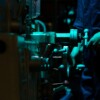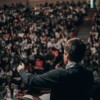“…but test everything; hold fast what is good.” — 1 Thess. 5:21 (ESV)
I teach computer science students how to program computers, and testing is a crucial component of learning to program. In fact, the modern approach to software engineering advocates a Test Driven Development where testing is simultaneously intertwined with the writing of code. The result is higher-quality programs with fewer bugs and failures.
In the past, I worked as an embedded systems engineer designing electronic circuit boards for industrial automation products. Before releasing some of our products into the world, we would perform HALT (Highly Accelerated Life Test) testing. HALT testing is a procedure that stresses a product under extreme temperature and vibration conditions to “shake out” the weaker parts in a design. By precipitating failures in the weaker components, this test identifies areas where the design can be improved before a product is released.
In 1 Thessalonians 5:21, Paul urges his listeners to “test everything” and “hold on to what is good.” In the context of this chapter, Paul is referring to prophecies, but I think this advice also applies to many other things, and not only in fields like programming and engineering.
The idea to “test everything” recognizes that we can’t simply accept everything with an uncritical embrace (or even assume things are neutral). The fact is, everything is intertwined with the effects of sin, and the “whole creation is groaning” (Rom. 8:22), and hence there is a need to test things. On the other extreme, we should not always reject things out of hand; the goodness of creation persists despite the impact of sin, and we ought to “hold on” to the “good.” Hence, the posture of the Christian should be neither blind acceptance nor blanket rejection, but careful discernment of creational possibilities. The Message translation puts it this way: “Check out everything and keep only what’s good. Throw out anything tainted with evil.”
Testing requires discernment and wisdom, which come from God. In Romans 12:2, we read: “Do not conform to the pattern of this world but be transformed by the renewing of your mind. Then you will be able to test and approve what God’s will is—his good, pleasing and perfect will.” Here, Paul links discernment with a renewed mind in Christ that enables us to test what is good.
In his book, The Presence of the Kingdom, the philosopher Jacques Ellul highlights this verse and makes four points that follow from it.
First, faith helps renew our intelligence and a “transformation of our ways of understanding, of looking at facts.” He goes on to say that the “Christian intellectual can no longer have…the same understanding of the things and of the world, and of their reality, and of man himself.”1 This is a significant point for those of us in higher education—our faith ought to change how we understand our disciplines.
Second, Ellul suggests that “this transformation relates to the present period in which we are living” and so the “Christian view comes into conflict with the spirit of this ‘present age’” and “because our intelligence is transformed…conformity to the present world breaks down.”2 This will present a challenge for academics who seek affirmation from their respective academic guilds. Ellul goes on to suggest that “the work of intellectuals in the church is very important; through this break with the world they ‘educate’ their fellow-Christians.”3 While Ellul muses on whether this is the “special work of the theologians,” I would suggest this is the special work of all Christian scholars.
Third, “this transformation takes place in Jesus Christ, through the action of the Holy Spirit.” Ellul goes on to write, “it is not only an intellectual process…but a transformation of life.” He concludes that “it is the Holy Spirit who henceforth inspires our minds, and enables us to discover new ways of thought, and new understanding of the world in which we live.”4
And fourth, “the aim of this transformation is that we may discern the will of God, particularly in the ethical sphere, since our text speaks to us of that which is ‘good, acceptable, and perfect.’” Ellul suggests that this is “a comprehension of that which man can and ought to do in this world in order to live according to the will of God.”5 The “ethical sphere” includes many areas, whether that be film, literature, business, human sexuality, politics, or recent developments in Artificial Intelligence.
As we are daily immersed in our cultural context, there is increasing pressure to “conform to the pattern of this world” and a pressing need to “test and approve what God’s will is,” also in our academic disciplines. Ellul observes that “in the sphere of the intellectual life” there is a “refusal, unconscious but widespread, to become aware of reality” and that “this is true especially for intellectuals.”6 Unfortunately, Christian intellectuals are not immune to an “unconscious refusal to see reality” and can be drawn into fashionable ideologies. A catchphrase among software developers is that “testing can only reveal the presence of bugs, not their absence.” Likewise, our testing of ideas in the “ethical sphere” can be flawed or incomplete. We need to cultivate epistemic humility; as Paul put it, “we see through a glass, darkly” and for now we know only in part (1 Cor. 13:12).
The word “professor” is derived from the Latin word for a “person who professes” and a Christian academic is called to profess that Christ is Lord of every square inch. As I write these words, we are set to begin the fall classes at Calvin University. I am reminded that part of the mission of Christian Higher Education is to help guide students into their various disciplines, ensuring we are not taken “captive through hollow and deceptive philosophy” (Col. 2:8). Rather, Christian professors are called to “take captive every thought to make it obedient to Christ” (2 Cor. 10:5), modeling wisdom and discernment, testing and discerning the ideas and ideologies in our areas of study, and holding on to what is good.
























Thank you, Derek, for this valuable reflection about Ellul and about our mission in Christian Higher Education. We should shape students with Christian understanding and practice so they reflect and test everyday experience carefully.
Thank you for this!
Encouraging.
It seems like what you say plays an important part of the answer when people question the role of the human in an age of A.I. Who is testing the response to a question that comes from Chat GPT?